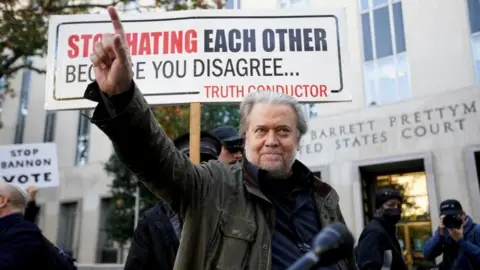Steve Bannon sentencing: Jail term shows January 6 risks for Trump
 Reuters
ReutersIt's been a major day for the congressional committee investigating the January 6, 2021 attack on the US Capitol.
On Friday morning, a judge sentenced Steve Bannon, a former top adviser to Donald Trump and prominent right wing media figure, to four months in prison and a $6,500 fine for failing to comply with the committee's subpoena.
A few hours later, the House January 6 committee issued its most dramatic subpoena yet - to Mr Trump himself. After building to this moment all year, the committee has laid the blame for the violent siege of the US Congress directly at the former president's feet, and now has Mr Trump squarely in their sights.
The historic request demanded the former president sit for a deposition to the committee under oath, and turn over extensive documents from the period between election day in 2020 until after the January 6 attack, including text messages, memos and emails. They demanded Mr Trump provide the documents by 4 November, and testify by 14 November. Mr Trump is not expected to comply, and the move could set off another legal skirmish.
The timing of these actions could not be more significant for the committee. Bannon's sentence strikes at the heart of Mr Trump's orbit and represents one of the most high-profile punishments yet handed down to his backers, several of whom have faced federal investigations. The outcome of a case like Bannon's, which is inextricably linked to the Capitol riot, could point to more turbulent times ahead for Mr Trump, and other top lieutenants.
A defiant court appearance
Despite the jeers of "fascist traitor!", Bannon looked relaxed as he arrived at a Washington, DC federal courthouse on Friday, clutching a copy of the Financial Times and commenting on "the global elites".
Before stepping inside, Bannon told a small group of journalists, live streamers, supporters, and critics that the "illegitimate regime, their judgement day is on 8th November, when the Biden administration ends".
It was the kind of language that got Bannon in trouble in the first place. Ahead of the January 6 attack that Trump supporters launched on the Capitol, he had told listeners that "all hell would break loose" that day.
After the 2020 election, Bannon was one of a gaggle of Trump allies who sought ways to overturn the results in favour of Mr Trump, who lost by several million votes but claimed victory regardless. He pushed election conspiracy theories on his War Room show, and encouraged listeners to get involved in efforts to question or overturn the results.
He then defied a congressional subpoena when the House committee investigating the January 6 riot demanded he comply with its inquiry, which Bannon had dubbed "a clown show."
The committee referred the case to the Justice Department, and the former top Trump adviser was found guilty of contempt of Congress earlier this year.
Before issuing his sentence, US District Judge Carl Nichols, a Trump appointee, noted Bannon had shown "no remorse for his actions". The sentence was a far cry from the six months in prison and the $200,000 fine sought by prosecutors, but the decision sent a message that courts were willing to take actions recommended by the January 6 committee.
'Why does Steve Bannon get his own system of justice?'
After the sentencing, Bannon said that he respected the judge and would appeal the sentence. But despite the court's admonishments, he lashed out at the Biden administration and called for the US attorney general to be impeached.
Some of Bannon's detractors did not feel the punishment went far enough. "If any of the rest of us were subpoenaed by Congress and refused to appear, we'd be thrown in jail," tweeted Tristan Snell, a former prosecutor in the New York attorney general's office. "Why does Steve Bannon get his own system of justice?"
Bannon's woes are just one aspect of the multi-pronged legal battles faced by Trumpworld.
Though the Republican Party remains almost uniformly deferential to Mr Trump, federal, state, and local prosecutors have launched multiple investigations into his actions, ranging in scope from fraud to election tampering to inappropriate handling of classified documents. Friday's congressional subpoena adds to the already teetering pile.
Mr Trump has repeatedly decried investigations into him and his associates as a partisan witch hunt designed to persecute conservatives, including when addressing supporters on the campaign trail.
Among some of Mr Trump's backers, Bannon's sentence will likely be treated as evidence that the federal bureaucracy has unfairly dogged the former president.
 Getty Images
Getty ImagesIt remains to be seen whether either of the day's developments will endure upcoming challenges. Mr Bannon could win his appeal. And should the Republican Party take over the House of Representatives after the midterm elections on 8 November, Trump's allies in Congress have vowed to disband - and even investigate - the January 6 committee.
If Bannon's appeal against the prison sentence does not succeed, a stint inside could silence him temporarily. But it remains to be seen whether a different version will emerge from this process. On Friday, the presiding judge said he hoped Bannon's punishment would at least have a cautionary effect on his imitators.
"Others must be deterred," Judge Nichols said, "from committing similar crimes".
